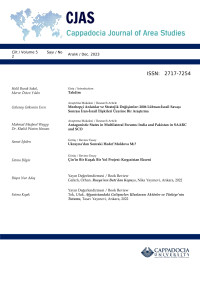Abstract
1949 yılında kurulan Çin Halk Cumhuriyeti uzun süre katı bir sosyalizm
uygulamasına maruz kalmıştır ancak bir süre sonra sistemin devamlılığının
sağlamayacağı fark edilince 1978 yılında ‘Reform ve Dışa Açılma’ politikası adı
altında bir plan izlenmiş ve bunun sonucunda da büyük bir ekonomik ilerleme
kaydedilmiştir. Ekonomik büyüme hedeflerini ilerletmek için Çin devlet lideri
Xi Jinping tarafından 2013 yılında Kazakistan’ın Nazarbayev Üniversite’nde
açıklanan ‘Bir Kuşak Yol Projesi’ ( One Belt One Road - OBOR) dünyadaki
ekonomik ve jeopolitik dengeleri değiştirmek üzere hazırlanmış önemli bir
projedir. Bu çalışmanın amacı projenin önemli bir kısmını içinde bulunduran
Orta Asya Coğrafyasında Çin’in ile bölge ülkelerinden olan Kırgızistan ile ilgili
politik tutumları ve projeye destek veren yatırımları analiz etmektedir.
Keywords
References
- Karagöl, E. T. (2017). Modern İpek Yolu Projesi. SETA Perspektif, 174 Erişim adresi: https://www.setav.org/modern-ipek-yolu-projesi/
- Özdaşlı, E. (2015). Çin’in Yeni İpek Yolu Projesi ve Küresel Etkileri, Turkish Studies 10(14), 579-596.
- Kutluay Tutar, F., Bahsi Koçer, F. Ş. (2019). Çin’in Yeni İpek Yolu Projesi: Bir Kuşak Bir Yol, Journal Of Social, Humanities and Administrative Sciences, 5(16), 618-626.
- Güneş, E. (2015). Çin-Rusya İlişkilerindeki Asimetrik Denge ve Amerika Birleşik Devletleri, Ankara Üniversitesi SBF Dergisi, 70(4), 839-867.
Abstract
Founded in 1949, the People's Republic of China was subjected to a
strict socialism practice for a long time, but after a while, when it was realized
that the continuity of the system would not be ensured, a plan called 'Reform
and Opening Up' policy was followed in 1978, and as a result, a great economic
progress was achieved. The 'One Belt Road Project', announced by Chinese
leader Xi Japing at Nazarbayev University in Kazakhstan in 2013 in
order to advance economic growth targets, is an important project prepared to
change the economic and geopolitical balances in the world. The aim of this study is to
establish a region between China and China in the Central Asian Geography,
which includes a significant part of the project. It analyzes the countries'
cooperation, political attitudes and investments supporting the project.
Keywords
References
- Karagöl, E. T. (2017). Modern İpek Yolu Projesi. SETA Perspektif, 174 Erişim adresi: https://www.setav.org/modern-ipek-yolu-projesi/
- Özdaşlı, E. (2015). Çin’in Yeni İpek Yolu Projesi ve Küresel Etkileri, Turkish Studies 10(14), 579-596.
- Kutluay Tutar, F., Bahsi Koçer, F. Ş. (2019). Çin’in Yeni İpek Yolu Projesi: Bir Kuşak Bir Yol, Journal Of Social, Humanities and Administrative Sciences, 5(16), 618-626.
- Güneş, E. (2015). Çin-Rusya İlişkilerindeki Asimetrik Denge ve Amerika Birleşik Devletleri, Ankara Üniversitesi SBF Dergisi, 70(4), 839-867.
Details
| Primary Language | Turkish |
|---|---|
| Subjects | International Relations (Other) |
| Journal Section | Review essays |
| Authors | |
| Publication Date | December 31, 2023 |
| Submission Date | November 19, 2023 |
| Acceptance Date | December 16, 2023 |
| Published in Issue | Year 2023 Volume: 5 Issue: 2 |


